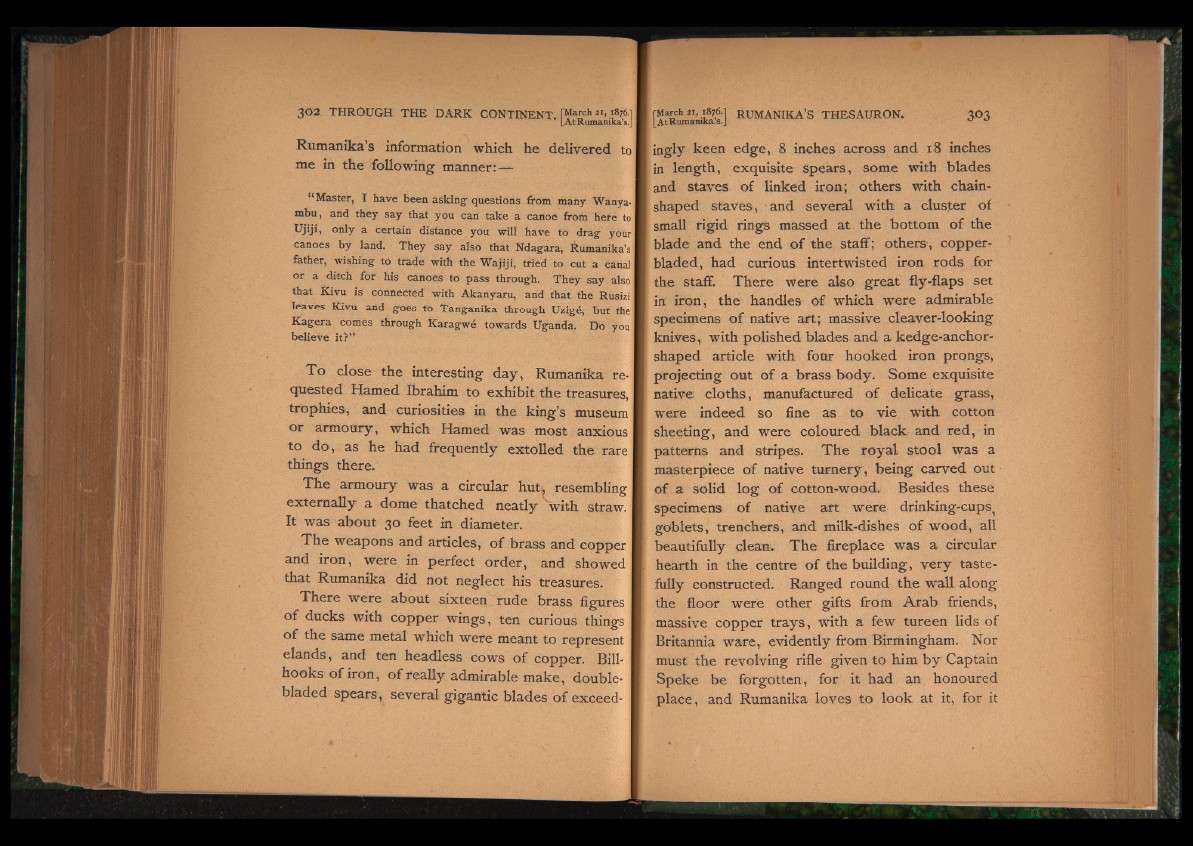
Rumanika’s information which he delivered to
me in the following manner:—
“Master, I have been asking1 questions from many Wanya-
mbu, and they say that you can take a canoe from here to
Ujyi, only a certain distance you will have to drag your
canoes by land. They say also that Ndagara, Rumanika’s
father, wishing tó trade with the Wajiji, tried to cut a canal
or a ditch for his canoes to pass through. They say also
that Kivu is connected with Akanyaru, and that the Rusizi
leaves Kivu and goes to Tanganika through Uzigé, but the
Kagera comes through Karagwé towards Uganda. Do you
believe it)”
T o close the interesting day, Rumanika requested
Hamed Ibrahim to exhibit the treasures,
trophies, and curiosities in the king’s museum
or armoury, which Hamed was most anxious
to do, as he had frequently extolled the rare
things there.
T h e armoury was a circular hut, resembling
externally a dome thatched neatly with straw.
It was about 30 feet in diaméter.
T h e weapons and articles, o f brass and copper
and iron, were in perfect order, and showed
that Rumanika did not neglect his treasures.
There were about sixteen rude brass figures
o f ducks with copper wings, ten curious things
o f the same metal which were meant to represent
elands, and ten headless cows o f copper. Billhooks
o f iron, o f really admirable make, double-
bladed spears, several gigantic blades o f exceedingly
keen edge, 8 inches across and 18 inches
in length, exquisite spears, some with blades
and staves of linked iron; others with chainshaped
staves, and several with a cluster of
small rigid rings massed at the bottom o f the
blade and the end o f the staff; others, copper-
bladed, had curious intertwisted iron rods for
the staff. There were also great fly-flaps set
in iron, the handles o f which were admirable
specimens o f native art; massive cleaver-looking
knives, with polished blades and a kedge-anchor-
shaped article with four hooked iron prongs,
projecting out o f a brass body. Some exquisite
native cloths, manufactured o f delicate grass,
were indeed so fine as to vie with cotton
sheeting, and were coloured black and red, in
patterns and stripes. T h e ro y a l stool was a
masterpiece o f native turnery, being carved out
o f a solid lo g o f cotton-woodr. Besides these
specimens o f native art were drinking-cups^
goblets, trenchers, and milk-dishes o f wood, all
beautifully clean. T h e fireplace was a circular
hearth in the centre o f the building, v e ry tastefully
constructed. Ranged round the wall along
the floor were other gifts from A rab friends,
massive copper trays, with a few tureen lids of
Britannia ware, evidently from Birmingham. Nor
must the revolving rifle given to him b y Captain
Speke be forgotten, for it had an honoured
place, and Rumanika lov es to lo o k at it, for it